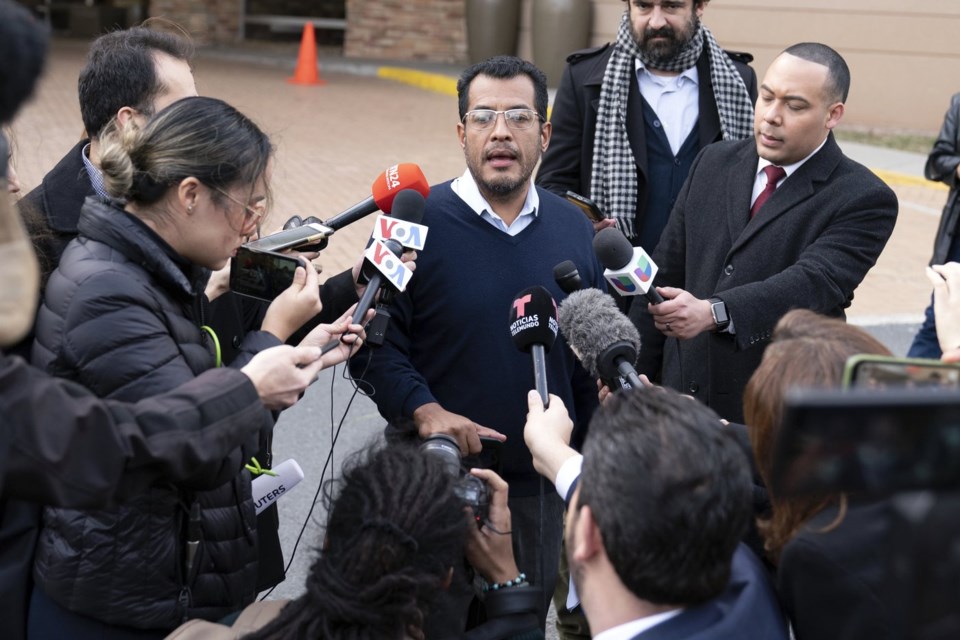DORAL, Fla. (AP) — A clandestine opposition movement remains active in Nicaragua, but options for restoring democracy in the Central American country are dwindling, former presidential challenger and political prisoner Félix Maradiaga told The Associated Press from his forced exile in the United States.
“The options are increasingly limited because the Sandinista dictatorship has radicalized,” the 48-year-old academic said in an interview in the Miami suburb of Doral. “One can’t ask the people who already sacrificed enormously, who had killings, who had exiles or … political prisoners, to keep sacrificing more without strong support from the international community.”
Nicaragua’s government, led by President Daniel Ortega and his wife and co-President, Rosario Murillo, has been cracking down on dissent since , claiming they were backed by foreign powers that sought his overthrow. The government has now through “severe human rights violations,” a panel of United Nations experts warned this year.
Sanctions are no “silver bullet,” Maradiaga said: It's also necessary to stop the global erosion of democracy, support the beleaguered political opposition inside the country, hit the channels financing Ortega's government and keep up pressure through human rights tribunals.
From child exile to presidential challenger to forced exile again
Maradiaga first fled Nicaragua for the United States in the 1980s, finding refuge with a foster family, when rebels backed by the Reagan administration fought the leftist Sandinista government. He returned but was forced to flee again as an adult after the Ortega government accused him of “financing” the 2018 protests and a judge ordered his arrest.
and was running for president against Ortega in 2021 alongside nearly 200 others, considered political prisoners by the U.S. State Department. Maradiaga was convicted of “harm to the national well-being,” a charge also applied to many other dissidents Nicaragua's government called “terrorists.” Maradiaga said at the time that he had been subjected to a political trial.
In February 2023, he was among 222 political, student and faith leaders taken from some of Nicaragua’s most notorious prisons and Shortly after, the Ortega government .
Maradiaga said he sought to challenge Ortega at the ballot — “even knowing there would be fraud, even knowing I would have to go to jail” — because he wanted to show the president he couldn’t win elections fairly. The United States, European Union members and other nations .
Continuing the fight for democracy from the US
“Now my role is to help the new generations of youth, so that they can organize politically, so that there can be a political alternative, a strategy of sanctions, a strategy of human rights, an umbilical cord with Nicaragua and also a way to be able to organize those in exile in a common strategy,” he said.
The work of exiles is crucial because they can be “a voice for those who don’t have a voice,” he said. They also can reach international institutions and contribute to Nicaragua’s economy — which makes the diaspora “an important actor in the possible scenario of the rescuing of democracy,” Maradiaga added.
But work like his, which also includes close contact with people who are organizing the opposition inside Nicaragua, comes at tremendous risk.
“Each time that someone in exile talks, we put at risk our family members inside the country, who are used essentially like hostages to shut us up,” Maradiaga said. “(The government) needs to kill hope, to create in the collective imagination the perception that there are no democratic leaders, that all the exiles are making money from it.”
The power of faith, which is also under attack
What keeps him going is his Catholic faith — something that the Nicaraguan government has also in the country.
“Without my faith, I wouldn’t be alive. Without my faith, I wouldn’t have the clarity that I want — and hope — to have in my principles,” Maradiaga said.
When he was first forced to flee Nicaragua as a 12-year-old, it was churches in Guatemala, Mexico and at the U.S. border that fed him — and his soul. Clergy including , now in exile in South Florida, were his guiding lights during the protests and unrest.
“When you feel that the international community has abandoned you, that you have lost your freedom and you have no access to the state’s protection because the state has become a terrorist state, the Catholic Church became our refuge,” Maradiaga said.
Throughout the hourlong interview, Maradiaga spoke of the need to keep forging ahead with hope. But tears welled up in his eyes when talking about his grandmother’s death the previous week in Matagalpa. During his last years in Nicaragua, he wasn’t able to visit her because the police prohibited him from leaving the capital even before his arrest.
“It’s the story of thousands and thousands of Nicaraguans who haven’t been able to bring flowers to their relatives’ graves,” Maradiaga said. “It’s a truly atrocious persecution and it demonstrates, with utter clarity though in a very painful way … the level of hatred and the fracturing of the Nicaraguan family caused by the dictatorship.”
___
Associated Press religion coverage receives support through the AP’s with The Conversation US, with funding from Lilly Endowment Inc. The AP is solely responsible for this content.
Giovanna Dell'orto, The Associated Press




